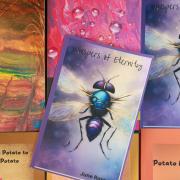Border collies Cosmo and Oscar from Lancaster are helping to change the lives of young people across the county

Dog owners know how much joy our beloved canine companions bring to our lives. They bring us companionship and unconditional love, and the therapeutic value of our relationship with our pets, particularly dogs, is increasingly recognised by researchers. In addition to helping alleviate stress, depression and loneliness, there are all the benefits that come from having to exercise a dog. Caring for a pet can also give a sense of purpose, achievement and can reap great rewards, helping people to feel valuable and needed.
Through working with young people with social and emotional needs, Lancastrian Sally Temple has come to realise that dogs can play an integral part in emotional well-being. Sally has combined her twin passions of dogs and helping youngsters who are affected by mental health issues with remarkable results. It seems that when young people and dogs interact, both parties benefit. Studies have shown that our happiness, and levels of chemicals like dopamine and oxytocin, increase after interacting with dogs - and the levels of stress-related chemicals like cortisol decrease thus helping youngsters to cope with depression and anxiety. Dogs, in turn benefit, experiencing an increase in these feel-good chemicals too.
In 2008 Sally, who over the years has worked as a teacher and youth worker was commissioned by the NHS to research and find what support was needed for young people with mental health difficulties. As a result of her findings, Sally, and her former boss Mick Piela, set up the charity ACE (Achieve, Change, Engagement). The charity, offers emotional health and wellbeing support to young people aged from 11 to 25 years who live in Lancaster, Fylde and Wyre.
‘Through my work with young people I was often told how supportive dogs were in helping to manage mental health symptoms and that’s what really led me to think that my dogs would make great therapy dogs,’ said Sally, who lives on a small holding in Quernmer.
‘My border collies are very intuitive when it comes to relating to people. I have seven border collies, four puppies and a poodle. My first collie was a pet and then about 17 years ago my husband bought me some sheep for my birthday, and I needed a sheep dog. I had no idea how to train a working dog so took lessons and that’s how I ended up with Cap. He was a remarkable dog and most of my dogs are descended from him. I got hooked on sheep trialling, but Cap just used to listen to my whistle commands and then go the opposite way because he knew better than me.
‘Cap would have been ideal as a therapy dog – calm, intelligent and responsive – and those traits have carried on through his descendants. Dogs that go back to Cap are currently supporting young people who have complex needs, both in Lancashire and further afield, and have shown how quickly they can tune into their owners needs and give much needed support.’
Sally explains how six-year-old border collie Cosmo, through his remarkable skills and companionship, has helped Cass, who is now 26, to cope with Post Traumatic Stress Disorder. Although Cass does not own Cosmo, he visits her weekly and has become her rock. Intuitively he knows when there are going to be tears and comes to lick her face when he senses that she is becoming upset.
‘He also knows to wake me up before my dreams become really bad and understands deep pressure therapy which means he leans against me or sits on me when I need it,’ said Cass.
‘He’s also learned to help with practical tasks and he helps me to look after him by bringing me his bowls to remind me to feed and water him. And he knows and understands the different alarms I have set for getting up, medication, breakfast and going for a walk and helps me stick to them.’
Cass also has functional neurological symptoms which means she is sometimes unable to walk or talk. On one winter walk when Cass collapsed, Cosmo came to her aid – instinctively covering her with leaves until help arrived. And remarkably, when he senses that it isn’t safe for Cass to leave home, he will try to stop her by wrapping his legs around her.
Sally added: ‘Border collies are so clever; if they have a loving owner, they will do everything they can to support them. They give unconditional love and never judge. Another of Cap’s descendants, Oscar, intuitively gives his all to help his owner Vikki Burns. Vikki has ME, alongside other medical conditions, and can get very down but it is just incredible how Oscar learned to help her. He came to her as a puppy and is now three and helps her in so many ways.’
With doggy diligence Oscar helps when Vikki is unable reach things. He opens doors and will step beneath something, such as dog food, to help lift it.
‘He has also learned to shout for help when I struggle to breathe and, prior to having medication increased I would choke a lot causing anxiety induced larynx problems. Oscar has learned the difference between responses that would help such as jumping on my chest area which will shock me enough to take a breath. Initially he struggled with my stress issues and would run around barking and snapping but is now a great therapy dog in terms of my mental health, knowing when calm time is needed or when I need pepping up. I know all dogs are responsive, but Oscar is truly something else,’ said Vikki.
Receiving help from the charity, alongside Cosmo’s camaraderie and dedication, has given Cass the confidence to volunteer as part of the ACE team and in turn, help others to overcome their difficulties.
Sally, who also gives her services voluntarily, added: ‘Sadly, because of Covid, we are coping with an extremely high demand. The pandemic is having a huge impact on our mental health which means we have a long waiting list for our services which shows how desperately this sort of help is needed.’
For more information, go online to a-c-e.org.uk.



























